Countries and seaports in the LSCI index. Poland ranks 5th in Northern Europe
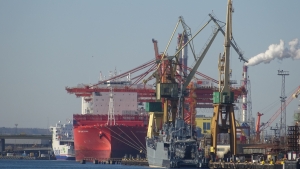
 By Marek Grzybowski
By Marek Grzybowski
Among the countries best connected by ocean connections, as many as seven countries are in Asia, and only two countries are in Europe. The leading countries whose ports are best connected with the world via linear connections are China, South Korea and Singapore. This is followed by the United States. Spain is the best-connected European country and ranks eighth on the global list, according to the latest IAPH World Ports Tracker report.
– Compared to the previous year (Q1 2023), the percentage increase in the LSCI (Liner Shipping Connectivity Index) in South Korea improved by 6.5%, in Japan it increased by 4.8%, in China by 2.7% and i significantly exceeded the rates in other countries – say Thanos Pallis, Theo Notteboom and Jean-Paul Rodrigue in Article No. 117 [UNCTAD Transport and Trade Facilitation Newsletter N°101 – First Quarter 2024].
The LSCI index includes 6 elements that have been used for calculations by UNCTAD and MDSTransmodal for two decades. Its size is influenced by: the number of direct connections to a given country and weekly connections. The indicator is influenced by the number of companies providing services and the number of services.
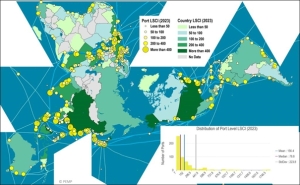 Source: Notteboom T., Pallis A., Rodrigue J-P. (2024). Port Economics, Management and Policy.
Source: Notteboom T., Pallis A., Rodrigue J-P. (2024). Port Economics, Management and Policy.
The total used capacity of ships in TEU on line connections and the size of ships servicing these connections are also taken into account (the largest ship is taken into account for calculations). UNCTAD actually uses two indicators to assess quarterly ocean transport activity: Liner shipping connectivity index (LSCI) and Port liner shipping connectivity index (PLSCI).
UNCTAD justifies the use of these indicators on the basis that over 80% of international trade in terms of volume and about 70% in terms of value is carried by sea. The bottom line is that “About two-thirds of maritime trade by value is carried in containers and transported on regular shipping services.”
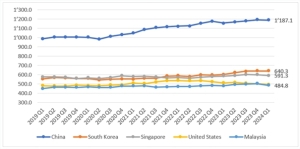
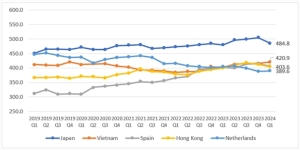
Asia with the best ocean connections
– Better connection through international transport services helps the country trade at lower costs, faster and with greater choice – emphasize Jan Hoffmann, Luisa Rodriguez, Benny Salo, Antonella Teodoro in Article No. 114, [UNCTAD Transport and Trade Facilitation Newsletter N°101 – First Quarter 2024]. According to them, “UNCTAD’s ocean liner data sets have proven to be valuable indicators for countries and ports by enabling monitoring of their position in the global liner shipping network.”
In the next four best-connected countries – Malaysia, Spain, Singapore and Vietnam – the LSCI index in February 2024 was 1% higher. The LSCI is lower in the Netherlands (-3.3%), the US (-3.3%), and Hong Kong and the special administrative regions (SARs) of China (-3.5%). Decreased activity in China moved Japan from eighth to sixth place. Hong Kong and China’s SAR regions moved three positions lower than a year earlier.
Compared to five years earlier (Q1 2019), the LSCI improved in eight of the top ten countries. Vietnam recorded a sharp improvement, by 30%, and advanced from 14th to seventh place as the best-connected country. The PRC improved communication via line connections by 20.4% and South Korea by 15%.
The following countries recorded smaller increases: Malaysia (+8%), Singapore (3%), the United States (+2.5%), Japan (+2%) Spain, thanks to a 10% improvement in LSCI, was the fourth country to record double-digit growth LSCI index. The LSCI is lower today than it was 5 years ago in the Netherlands (-8%) and Hong Kong and Chinese SARs (-13%). After five years, Great Britain (from 9th to 11th) and Belgium (from 10th to 12th) dropped out of the top ten.
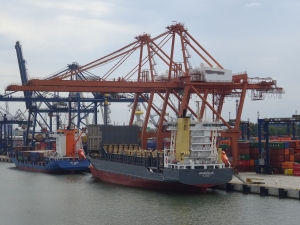
Poland in 5th place
The five best-connected countries in Northern Europe are the Netherlands (10th best-connected country in the world), Great Britain (11th), Belgium (13th), Germany (16th) and Poland (38th).
Overall, on an annual basis, LSCI levels in the region remained relatively stable. Decreases were recorded in 3 countries: in the Netherlands (-3.3%), Belgium (-2%) and Germany (-3.5%), the LSCI index in the first quarter of 2024 is lower than in the first quarter of 2023. These declines have been consistent for five years.
Since the first quarter of 2019, the LSCI in the Netherlands and Belgium has decreased by 8%. In Germany, the decline in LSCI was even more significant and amounted to 15%, which means that Germany dropped from 12th to 16th place in the country with good linear connections. In the UK, the LSCI is 1.7% higher than a year ago. This did not reverse the 5-year trend. During this period, the index has been decreasing since 2019 and currently stands at -6%. Albion dropped out of 10th place.
Poland recorded a 12.3% increase in LSCI last year, which means an increase of 8% compared to the first quarter of 2019. Thanks to the activity of the economy and the use of ports to rebuild supplies, Poland jumped five positions higher in the UNCTAD rankings during the year.
Latvia also (an increase of 17%) improved its position in the world rankings by seven places. Iceland increased LSCI by 8%, which translated into a jump of 5 positions), Lithuania (+8%; +2) and Sweden (+4%; +1). These are the countries in Northern Europe where the LSCI index increased year on year. At the same time, Estonia recorded the most noticeable decline in LSCI (-21%;).
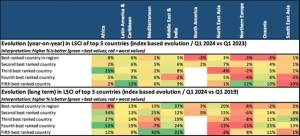
The Mediterranean Sea is in a good position
The five best connected Mediterranean countries by rail connections are Spain (8th), Turkey (17th), Italy (18th), France (19th) and Morocco (20th). Thanks to moderate port activity, the LSCI for Spain and Italy is higher than last year by 1% and 1.9%, respectively. During the same period, Turkey grew by 5.1%, France (+5.6%) and Morocco (+6.1%).
All countries in the region except Israel improved their LSCI last year. Tunisia recorded great dynamics (+22%), which improved its position in the world ranking by 15 positions, followed by Romania (+20%; six positions); Lebanon (+17%; eight positions), Bulgaria (+14%; seven positions) and Algeria (+13%; seven positions).
These were the five countries from the Mediterranean and Black Sea regions that recorded a double-digit percentage increase in the index during the Black Sea War. There are two exceptions in the region. In Israel, the LSCI in Q1 2024 was 29% lower than a year earlier. Ukraine does not provide data, although minimal operational activity is registered there.
source of figures: IAPH World Ports Tracker Issue 6; Analysis of data provided by UNCTAD and MDS Trans-modal
